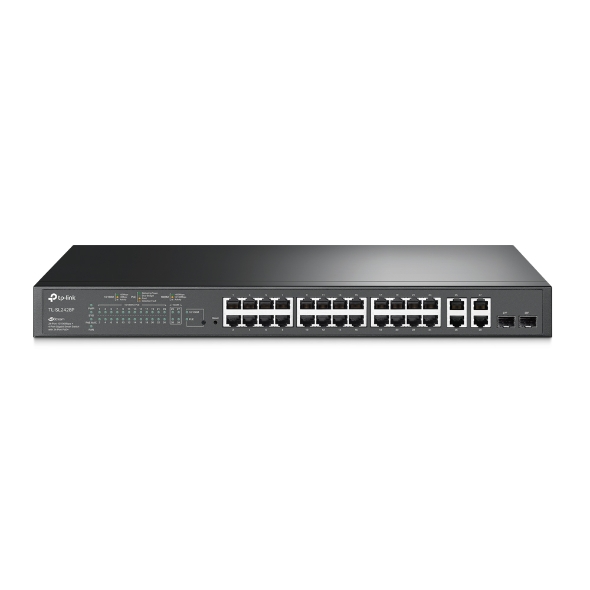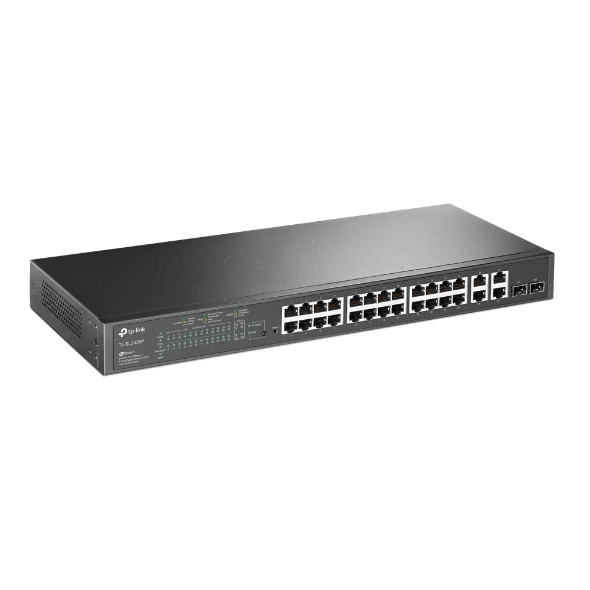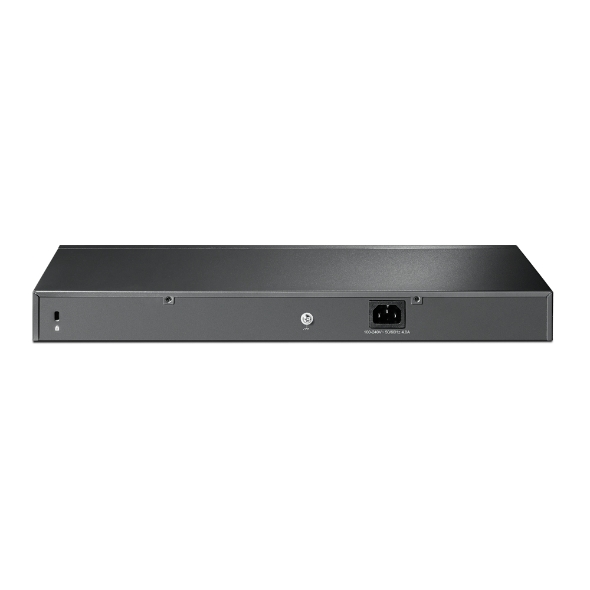JetStream 24-Port 10/100Mbps + 4-Port Gigabit Smart Switch with 24-Port PoE+
- 250 W PoE Budget: 24× 802.3at/af-compliant PoE+ ports with a total power supply of 250 W*.
- Gigabit Ports: 2× Gigabit RJ45 ports and 2× Combo Gigabit RJ45/SFP Ports provide high-speed connections.
- Integrated into Omada SDN: Zero-Touch Provisioning**, Centralized Cloud Management, and Intelligent Monitoring.
- Centralized Management: Cloud access and Omada app for ultra convenience and easy management.
- Optimize Voice and Video Applications: L2/L3/L4 QoS and IGMP snooping.
Learn more about TP-Link PoE technology >
 Centralized Management
Centralized Management
Realize More Possibilities with Omada
JetStream 24-Port 10/100Mbps + 4-Port Gigabit Smart PoE+ Switch
TL-SL2428P
Dedicated 24 PoE+ Ports (250 W Budget) for Numerous Applications
Compliance with the 802.3af/at PoE+ standard supports up to 30 W on each PoE port. The total 250 W PoE power budget* for the 24× 10/100Mbps PoE+ ports makes it has a wide range of applications, such as surveillance, offices, dormitories, and small businesses. It is fully compatible with IP cameras, access points, IP phones, computers, printers, etc.
Up to 30 W on Each Port
Total 250 W Power Budget*
Software Defined Networking (SDN) with Cloud Access
Omada’s Software Defined Networking (SDN) platform integrates network devices, including access points, switches and gateways, providing 100% centralized cloud management. Omada creates a highly scalable network—all controlled from a single interface. Seamless wireless and wired connections are provided, ideal for use in hospitality, education, retail, offices, and more.
-
Hassle-Free Cloud or
On-Premises Controllers -
Multi-Site Cloud
Management -
Zero-Touch
Provisioning (ZTP)** -
Intelligent
Monitoring
Related Cases
-
Texas Roadhouse
Omada Helps Texas Roadhouse Build a Reliable Network
Texas Roadhouse
Omada Helps Texas Roadhouse Build a Reliable Network
“The newly updated network infrastructure is performing well, and Texas Roadhouse is experiencing no crashes with their POS systems as they were previously, which saves a lot of unnecessary cost causing by POS system crush before.” -
Soborka ISP
TP-Link Helps ISP Soborka Provide Better Service for Subscribers
Soborka ISP
TP-Link Helps ISP Soborka Provide Better Service for Subscribers
“TP-Link’s products offer tremendous value, which allowed us to reduce the cost of updating our large network without compromising performance. Our customers are much more satisfied with the network since the upgrade. It has done a lot to improve our reputation.” —Soborka's CEO
| HARDWARE FEATURES | |
|---|---|
| Standards and Protocols | IEEE 802.3i, IEEE 802.3u, IEEE 802.3ab, IEEE802.3z, IEEE 802.3ad, IEEE 802.3x, IEEE 802.3az, IEEE 802.1d, IEEE 802.1s, IEEE 802.1w, IEEE 802.1q, IEEE 802.1x, IEEE 802.1p, IEEE 802.3af, IEEE 802.3at |
| Interface | • 24× 10/100Mbps RJ45 Ports (Auto Negotiation/Auto MDI/MDIX)• 2× 10/100/1000Mbps RJ45 Ports (Auto Negotiation/Auto MDI/MDIX)• 2× Combo Gigabit Uplink RJ45/SFP Ports |
| Network Media | 10BASE-T: UTP category 3, 4, 5 cable (maximum 100m)100BASE-TX/1000Base-T: UTP category 5, 5e or above cable(maximum 100m)1000BASE-X: MMF, SMF |
| Fan Quantity | 2 |
| Physical Security Lock | Yes |
| PoE Budget | 250 W |
| Dimensions ( W x D x H ) | 17.3×7.1×1.7 in.(440×180×44 mm) |
| Mounting | Rack Mountable |
| Max Power Consumption | • V4.2: 286.7 W (220 V / 50 Hz with 250 W PD connected); 18.8 W (220 V / 50 Hz with no PD connected)• V5: 293.6 W (110 V / 60 Hz) (with 250 W PD connected)• V6: 291.6 W (110 V / 60 Hz) (with 250 W PD connected) |
| Max Heat Dissipation | • V4.2: 977.6 BTU/h (220 V / 50 Hz with 250 W PD connected); 64.1 BTU/h (with no PD connected)• V5: 1001.2 BTU/hr (110 V/60 Hz) (with 250 W PD connected)• V6: 995.09 BTU/hr (110V/60Hz) (with 250 W PD connected) |
| PERFORMANCE | |
|---|---|
| Switching Capacity | 12.8 Gbps |
| Packet Forwarding Rate | 9.5 Mpps |
| MAC Address Table | 8K |
| Jumbo Frame | 9216 Bytes |
| SOFTWARE FEATURES | |
|---|---|
| Quality of Service | • 802.1p CoS/ DSCP priority• 8 priority queues• Priority Schedule Mode - SP (Strict Priority) - WRR (Weighted Round Robin) • Queue Weight Config• Bandwidth Control - Port/Flow based Rating Limit• Smoother Performance• Actions for flows- Mirror(to supported interface)- Redirect(to supported interface)- Rate Limit- QoS Remark• Storm Control - Multiple Control Modes(kbps/ratio/pps) - Broadcast/Multicast/Unknown-Unicast Control |
| L3 Features | • 16 IPv4/IPv6 Interfaces• Static Routing- 48 static routes• Static ARP- 128 static entries• 316 ARP Entries• Proxy ARP• Gratuitous ARP• DHCP Server• DHCP Relay- DHCP interface relay- DHCP VLAN relay• DHCP L2 Relay |
| L2 Features | • Link Aggregation - Static link aggregation - Up to 8 aggregation groups and up to 8 ports per group - 802.3ad LACP• Spanning Tree Protocol - 802.1D STP - 802.1w RSTP - 802.1s MSTP - STP Security: Loop back detection, TC Protect, BPDU Filter/Protect, Root Protect• Loopback Detection - Port based - VLAN based• Flow Control - 802.3x Flow Control - HOL Blocking Prevention• Mirroring - Port Mirroring - One-to-One - Many-to-One - Tx/Rx/Both - CPU Mirroring |
| L2 Multicast | • Supports 511 (IPv4, IPv6) IGMP groups• IGMP Snooping - IGMP v1/v2/v3 Snooping - Fast Leave - IGMP Snooping Querier - IGMP Authentication• IGMP Authentication• MVR• MLD Snooping - MLD v1/v2 Snooping - Fast Leave - MLD Snooping Querier - Static Group Config - Limited IP Multicast• Multicast Filtering: 256 profiles and 16 entries per profile |
| Advanced Features | • Automatic Device Discovery• Batch Configuration• Batch Firmware Upgrading• Intelligent Network Monitoring• Abnormal Event Warnings• Unified Configuration• Reboot Schedule |
| IPv6 Support | • IPv6 Dual IPv4/IPv6• Multicast Listener Discovery(MLD) Snooping• IPv6 neighbor discovery (ND)• Path maximum transmission unit (MTU) discovery• Internet Control Message Protocol (ICMP) version 6• TCPv6/UDPv6• IPv6 applications - DHCPv6 Client - Ping6 - Tracert6 - Telnet(v6) - IPv6 SNMP - IPv6 SSH - IPv6 SSL - Http/Https - IPv6 TFTP |
| VLAN | • VLAN Group - Max 4K VLAN Groups• 802.1Q Tagged VLAN• MAC VLAN: 12 Entries• Protocol VLAN: Protocol Template 16, Protocol VLAN 16• Private VLAN• GVRP• VLAN VPN (QinQ)- Port-Based QinQ- Selective QinQ• Voice VLAN |
| Access Control List | • Time-based ACL• MAC ACL- Source MAC- Destination MAC- VLAN ID- User Priority- Ether Type• IP ACL-Source IP- Destination IP- Fragment- IP Protocol- TCP Flag- TCP/UDP Port- DSCP/IP TOS- User Priority• Combined ACL• Packet Content ACL• IPv6 ACL• Policy- Mirroring- Redirect- Rate Limit- QoS Remark• ACL apply to Port/VLAN |
| Security | • IP-MAC-Port Binding- DHCP Snooping- ARP Inspection- IPv4 Source Guard• IPv6-MAC-Port Binding- DHCPv6 Snooping- ND Detection- IPv6 Source Guard• DoS Defend• Static/Dynamic Port Security- Up to 64 MAC addresses per port• Broadcast/Multicast/Unicast Storm Control- kbps/ratio/pps control mode• IP/Port/MAC based access control• 802.1X- Port based authentication- Mac based authentication- VLAN Assignment- MAB- Guest VLAN- Support Radius authentication and accountability• AAA (including TACACS+)• Port Isolation• Secure web management through HTTPS with SSLv3/TLS 1.2• Secure Command Line Interface (CLI) management with SSHv1/SSHv2 |
| IPv6 | • IPv6 Dual IPv4/IPv6• Multicast Listener Discovery (MLD) Snooping• IPv6 ACL• IPv6 Interface• Static IPv6 Routing• IPv6 neighbor discovery (ND)• Path maximum transmission unit (MTU) discovery• Internet Control Message Protocol (ICMP) version 6• TCPv6/UDPv6• IPv6 applications- DHCPv6 Client- Ping6- Tracert6- Telnet (v6)- IPv6 SNMP- IPv6 SSH- IPv6 SSL- Http/Https- IPv6 TFTP |
| MIBs | • MIB II (RFC1213)• Interface MIB (RFC2233)• Ethernet Interface MIB (RFC1643)• Bridge MIB (RFC1493)• P/Q-Bridge MIB (RFC2674)• RMON MIB (RFC2819)• RMON2 MIB (RFC2021)• Radius Accounting Client MIB (RFC2620)• Radius Authentication Client MIB (RFC2618)• Remote Ping, Traceroute MIB (RFC2925)• Support TP-Link private MIBs |
| MANAGEMENT | |
|---|---|
| Omada App | Yes. Requiring the use of OC300, OC200, Omada Cloud-Based Controller, or Omada Software Controller. |
| Centralized Management | • Omada Cloud-Based Controller• Omada Hardware Controller (OC300)• Omada Hardware Controller (OC200)• Omada Software Controller |
| Cloud Access | Yes. Requiring the use of OC300, OC200, Omada Cloud-Based Controller, or Omada Software Controller. |
| Zero-Touch Provisioning | Yes. Requiring the use of Omada Cloud-Based Controller. |
| Management Features | • Web-based GUI• Command Line Interface (CLI) through telnet• SNMPv1/v2c/v3• SNMP Trap/Inform• RMON (1,2,3,9 groups)• SDM Template• DHCP/BOOTP Client• Dual Image, Dual Configuration• CPU Monitoring• Cable Diagnostics• EEE• SNTP• System Log |
| OTHERS | |
|---|---|
| Certification | CE, FCC, RoHS |
| Package Contents | • TL-SL2428P• Power Cord• Installation Guide• Rackmount Kit• Rubber Feet |
| System Requirements | Microsoft® Windows® 98SE, NT, 2000, XP, Vista™ or Windows 7/8/10/11, MAC® OS, NetWare®, UNIX® or Linux. |
| Environment | • Operating Temperature: 0℃~50℃ (32℉~122℉);• Storage Temperature: -40℃~70℃ (-40℉~158℉)• Operating Humidity: 10%~90% non-condensing• Storage Humidity: 5%~90% non-condensing |
*PoE budget calculations are based on laboratory testing. Actual PoE power budget is not guaranteed and will vary as a result of client limitations and environmental factors.
**Zero-Touch Provisioning requires the use of Omada Cloud-Based Controller. Go to https://www.tp-link.com/en/omada-cloud-based-controller/product-list/ to confirm which models are compatible with Omada Cloud-Based Controller.
















